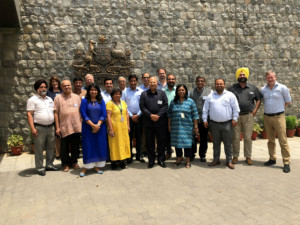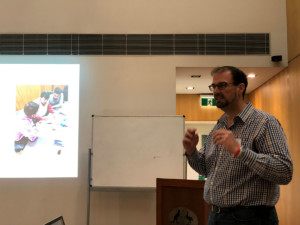Today is World Environment Day. Preventing environmental degradation is critical to sustain agricultural production systems, curtail pollution and improving human health. In the past few blog posts, we have mentioned the issue of stubble burning in North West India and the harmful impact on the environment, which in turn affects soil and human health.
A key focus for agricultural policy makers in India must be upon sustainable natural resource management. It is important to implement programs to address the straw burning issue through shifting farmer’s views and effective incentives to bring about behavioural change. Australian Centre for International Agricultural Research (ACIAR) has funded a project to identify factors that will enhance the adoption of conservation agriculture technologies like the Happy Seeder in the Indian Gangetic Plains. The adoption of technologies like Happy Seeder remains very low across the Indian Gangetic plains, especially in the North-Western states of Punjab and Haryana. GFAR has recently conducted value chain analyses for this project to identify challenges faced by key stakeholders involved in the Happy Seeder value chain to identify potential opportunities to enhance the dissemination of these conservation agriculture technologies. A policy think-tank workshop was held last week at the Australian High Commission in India’s capital, New Delhi. The policy development think- tank included leading researchers from research organisations like Trust for Advancement of Agricultural Sciences (TAAS), Indian Council of Agricultural Research (ICAR), CIMMYT, ACIAR, International Food Policy Research Institute (IFPRI), Borlaug Institute for South Asia (BISA), Punjab Agricultural University (PAU), World Bank and GFAR.
GFAR researchers Prof. Wendy Umberger, Dr. Adam Loch and Dr. Jay Cummins attended this workshop. The agenda for the workshop was to identify guiding principles that decision makers could consider to develop suitable policy around adoption of Happy Seeder and Zero-Till technologies. The workshop was organised to consider the issues in the context of results from the value chain analyses data collection. The data collection activities comprised in-depth interviews with 130 stakeholders to understand their views on Happy Seeder and Zero-Till adoption in the Indian Gangetic plains. The participants discussed a range of ways in which public and private sector investment could be made to accelerate adoption, address technical knowledge gaps, and identify viable entrepreneurial business models. The outcome from this workshop will be a policy briefing paper, which will be aimed at providing a road map for Indian agricultural policy-makers and an integrated plan for addressing straw burning issues.
Some of the key insights gained from discussions at the workshop include:
- Focus on a staged, multi-pronged approach to change involving several united strategies to tackle different change requirements
- Market development and improving technical skills and encouraging investments that may form a basis for the policy – including involving private service providers
- Existing training models will provide a sound basis for upskilling around this technology; cognisant of important gender issues and self-help networks that must feature in the policy framework design
Next steps in this project include distilling the findings into a policy-briefing document to be presented to policy makers in future workshops. Focus on impact of change, implementation cues and the potential for change in the national interest of India.
The Happy Seeder has the potential to be a real catalyst for change in the agricultural production systems in India that can result in reducing the environmental degradation caused by stubble burning. Recently there has been considerable attention given to this technology by various leading research agencies and media releases.
Below are some of the links to recent media releases:




